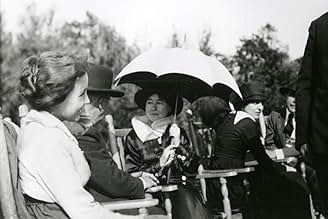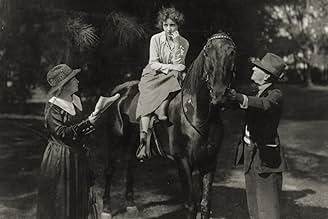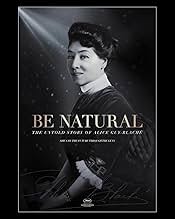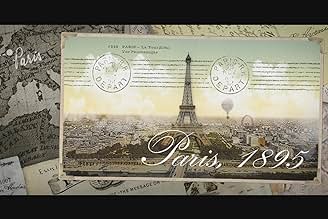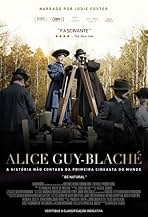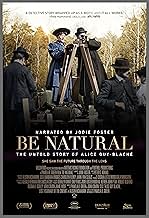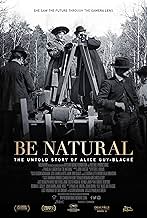Be Natural : L'Histoire cachée d'Alice Guy-Blaché
Titre original : Be Natural: The Untold Story of Alice Guy-Blaché
- 2018
- Tous publics
- 1h 43min
NOTE IMDb
7,7/10
1,2 k
MA NOTE
Le film dynamique de Pamela B. Green sur la cinéaste pionnière Alice Guy-Blaché est à la fois un hommage et une véritable enquête, retraçant les circonstances dans lesquelles elle s'est retr... Tout lireLe film dynamique de Pamela B. Green sur la cinéaste pionnière Alice Guy-Blaché est à la fois un hommage et une véritable enquête, retraçant les circonstances dans lesquelles elle s'est retrouvée effacée de la mémoire collective.Le film dynamique de Pamela B. Green sur la cinéaste pionnière Alice Guy-Blaché est à la fois un hommage et une véritable enquête, retraçant les circonstances dans lesquelles elle s'est retrouvée effacée de la mémoire collective.
- Réalisation
- Scénario
- Casting principal
- Récompenses
- 11 victoires et 11 nominations au total
Jodie Foster
- Narrator
- (voix)
Jon M. Chu
- Self
- (as Jon Chu)
Avis à la une
I HAD heard of Guy-Blache, but then I have been a silent film geek for almost 50 years now. Have been catching what I can on-line of her work - so far, 1916 The Ocean Waif is the best, Doris Kenyon was a far more natural actress then Pickford or the Gish sisters based on that film.
I think that Simon could have skipped including so many phone interviews with distance relatives of Guy-Blache, (many of which could have used subtitles, I found them hard to understand) and included some longer clips of her actual films instead. It is obvious that a lot of work went into digging up information on Guy-Blache, and I appreciate it, but would rather have seen more of her work than her family life. Still, I gave it 9 out of 10 stars since the subject matter is so important to film history...and I LOVE the opening postcard collages that take the viewer back in time and across the ocean!
I think that Simon could have skipped including so many phone interviews with distance relatives of Guy-Blache, (many of which could have used subtitles, I found them hard to understand) and included some longer clips of her actual films instead. It is obvious that a lot of work went into digging up information on Guy-Blache, and I appreciate it, but would rather have seen more of her work than her family life. Still, I gave it 9 out of 10 stars since the subject matter is so important to film history...and I LOVE the opening postcard collages that take the viewer back in time and across the ocean!
10puckamo
The director spent a decade of her life gathering evidence that Alice Guy-Blache was one of the founders of cinema, on the same level as the Lumiere Brothers, Georges Melies and Thomas Edison, and the case she makes is completely convincing. This film should be seen by everyone interested in movie history.
Greetings again from the darkness. History can easily be distorted by those who tell it. But the work and deeds of those who make history stands the test of time, and research can often right a wrong ... or at least provide credit where it's due. Such is the case with Pamela B Greene's project to uncover the truth, and finally give pioneer filmmaker Alice Guy-Blache her rightful place in the history of cinema.
Numerous familiar faces from the movie industry flash across the screen, and most admit they have never heard of Alice Guy-Blache. Even the few that recognize the name, don't know her story. This is how the movie starts ... letting off the hook those of us who pride ourselves on knowing the basics of cinema's origins. In 1895, the Lumiere Brothers presented the first short films on their newly developed Cinematographe. In the audience that day were Leon Gaumont and his assistant, Alice Guy.
Young Ms. Guy had a creative vision for this fascinating new technology. Rather than filming "real life", she would tell stories. And telling stories through moving pictures is exactly what she did more than 1000 times across two decades and two countries. In 1896, she directed THE CABBAGE FAIRY, one of the first narrative films ... and it was only the beginning for her. Director Greene explains that so many of those early films are lost, despite being described as sophisticated, emotional, and engaging works. As she moved from France to the United States (New Jersey), Alice founded Solax with her husband, and began experimenting with sound, special effects, gender roles, and story structure.
It's truly fascinating to see the clips from many of her films, along with snippets from interviews she sat for in 1964 (before passing away in 1968). Director Greene also includes interviews from Alice's daughter Simone, while I believe are from the 1980's. Simone is able to fill in some of the gaps in the historical timeline ... a timeline that includes many familiar names. It's also a timeline that results in an abrupt end to Alice's filmmaking when she relocates back to France after the war.
How did Alice Guy-Blache get lost in history? She was a contemporary of Melies, Lumiere and the Pathe brothers. She was not just the first woman director, she was also one of the first film directors, period. Though the search continues for many of her films, Oscar winning actress Jodie Foster narrates the mission of filmmaker Pamela B Greene to right a wrong ... Alice must no longer be forgotten by the industry she helped create.
Numerous familiar faces from the movie industry flash across the screen, and most admit they have never heard of Alice Guy-Blache. Even the few that recognize the name, don't know her story. This is how the movie starts ... letting off the hook those of us who pride ourselves on knowing the basics of cinema's origins. In 1895, the Lumiere Brothers presented the first short films on their newly developed Cinematographe. In the audience that day were Leon Gaumont and his assistant, Alice Guy.
Young Ms. Guy had a creative vision for this fascinating new technology. Rather than filming "real life", she would tell stories. And telling stories through moving pictures is exactly what she did more than 1000 times across two decades and two countries. In 1896, she directed THE CABBAGE FAIRY, one of the first narrative films ... and it was only the beginning for her. Director Greene explains that so many of those early films are lost, despite being described as sophisticated, emotional, and engaging works. As she moved from France to the United States (New Jersey), Alice founded Solax with her husband, and began experimenting with sound, special effects, gender roles, and story structure.
It's truly fascinating to see the clips from many of her films, along with snippets from interviews she sat for in 1964 (before passing away in 1968). Director Greene also includes interviews from Alice's daughter Simone, while I believe are from the 1980's. Simone is able to fill in some of the gaps in the historical timeline ... a timeline that includes many familiar names. It's also a timeline that results in an abrupt end to Alice's filmmaking when she relocates back to France after the war.
How did Alice Guy-Blache get lost in history? She was a contemporary of Melies, Lumiere and the Pathe brothers. She was not just the first woman director, she was also one of the first film directors, period. Though the search continues for many of her films, Oscar winning actress Jodie Foster narrates the mission of filmmaker Pamela B Greene to right a wrong ... Alice must no longer be forgotten by the industry she helped create.
In "Be Natural: The Untold Story of Alice Guy-Blaché," Jodi Foster narrates Pamela B. Green's engaging, fascinating, informative, 103-minute documentary that focuses on the remarkable, obscure career of pioneering, Paris-born, first woman filmmaker Alice Guy-Blaché (1873-1968) who wrote, directed, and/or produced more than 1,000 films many with unconventional subject matter through her film production company Solax and tells her story through candid interview snippets with the groundbreaking filmmaker in 1964, excerpts from her letters, and black-and-white film clips and photographs and includes insightful interviews with filmmakers (such as Ava DuVernay, Catherine Hardwicke, Diablo Cody, Patricia Riggen, Tacita Dean, Julie Taymor, John Chu, Ann Fletcher, Liz Goldwyn, Cari Beauchamp, Cecile Starr, Anne Fontaine, Mark Romanek, Peter Farrelly, Floria Sigismondi, Kevin Macdonald, Maxine Haleff, Patty Jenkins, Michel Hazanavicius, Marjane Satpari, and Gary Mairs), actors (such as Sir Ben Kingsley, Julie Delpy, Evan Rachel Wood, Geena Davis, Lake Bell, Andy Samberg, Janeane Garofolo, and Kathleen Turner), producers Marc Abraham and Stephanie Dillain, Co-President of Roadside Attractions Howard Cohen, screenwriter Gale Ann Hurd, film critic Peter Bogdanovich, historians (such as Mark Wanamaker, Anthony Slide, Kevin Brownlow, Glenn Myrent, Alison McMahon, Naum 'Kleiman, and Alan Williams), Guy-Blaché memoirs co-editor Claire Clouzet, film preservationist Serge Bromberg, professors (such as Drake Stutesman, Jane Goenes, Henry Jenkins, Gigi Pritzker, Richard Koszaeski, and Vanessa Schwartz), journalist Jean-Michel Frodon, film editor Walter Murch, film archivist Dino Everett, facial recognition analyst Steve Wilkins, costume designer Deborah Nadvolman Landis, lecturer Roland-Francois Lick, cinematographers (such as Pierre-William Glenn, Claire Wickell, and John Bailey), film collector Murray Glass, visual effects supervisor Mark Stetson, Academy of Motion Picture Arts and Sciences President John Bailey, and granddaughter Tatiana Page-Relo.
I watched that film during the BFI film festival and the director Pamela B Green graced us with a Q&A at the end. This documentary is a formidable labour of love, extraordinarily documented and thorough, on the life and career of the first film director who ... happened to be a woman! Alice Guy-Bache! Terrific documentary, although it was so fast-paced that I felt dizzy at times! A must watch!
Le saviez-vous
- AnecdotesOriginal written source: "Alice Guy Blaché: Lost Visionary of the Cinema", book by Alison McMahan, Bloomsbury Publishing, London, 2002, 408 p., ISBN: 978-0826451576.
- Citations
Bob Channing: If it wasn't for people like you, she'd just remain buried.
- ConnexionsFeatures Dickson Experimental Sound Film (1894)
Meilleurs choix
Connectez-vous pour évaluer et suivre la liste de favoris afin de recevoir des recommandations personnalisées
- How long is Be Natural: The Untold Story of Alice Guy-Blaché?Alimenté par Alexa
Détails
- Date de sortie
- Pays d’origine
- Sites officiels
- Langues
- Aussi connu sous le nom de
- Be Natural : L'Histoire inédite d'Alice Guy-Blaché
- Lieux de tournage
- Sociétés de production
- Voir plus de crédits d'entreprise sur IMDbPro
Box-office
- Montant brut aux États-Unis et au Canada
- 117 511 $US
- Week-end de sortie aux États-Unis et au Canada
- 3 237 $US
- 21 avr. 2019
- Montant brut mondial
- 210 247 $US
- Durée1 heure 43 minutes
- Couleur
Contribuer à cette page
Suggérer une modification ou ajouter du contenu manquant

Lacune principale
By what name was Be Natural : L'Histoire cachée d'Alice Guy-Blaché (2018) officially released in India in English?
Répondre


